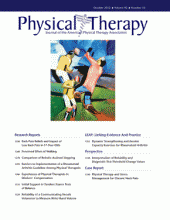Abstract
Background Physical therapists have an active role in the rehabilitation of injured workers. However, regulations in Queensland, Australia, do not afford them the opportunity to participate in return-to-work (RTW) decisions in a standardized way. No prior research has explored the experiences and perceptions of therapists in determining work capacity.
Objectives The aim of this study was to investigate physical therapists' experiences with and perspectives on their role in determining readiness for RTW and work capacity for patients receiving workers' compensation in Queensland.
Design A qualitative design was used. Participants were physical therapists who manage injured workers.
Methods Novice (n=5) and experienced (n=20) therapists managing patients receiving workers' compensation were selected through purposeful sampling to participate in a focus group or semistructured telephone interviews. Data obtained were audio-recorded and transcribed verbatim. Transcripts were thematically analyzed. Physical therapists' confidence in making RTW decisions was determined with 1 question scored on a 0 to 10 scale.
Results Themes identified were: (1) physical therapists believe they are important in RTW, (2) physical therapists use a variety of methods to determine work capacity, and (3) physical therapists experience a lack of role clarity. Therapists made recommendations for RTW using clinical judgment informed by subjective and objective information gathered from the injured worker. Novice therapists were less confident in making RTW decisions.
Conclusion Therapists are well situated to gather and interpret the information necessary to make RTW recommendations. Strategies targeting the Australian Physiotherapy Association, physical therapists, and the regulators are needed to standardize assessment of readiness for RTW, improve role clarity, and assist novice practitioners.
Footnotes
Dr Johnston, Dr Nielsen, and Adjunct Professor Franche provided concept/idea/research design, writing, and data analysis. Dr Johnston and Dr Nielsen provided data collection. Dr Johnston provided project management. Dr Johnston, Associate Professor Corbière, and Adjunct Professor Franche provided consultation (including review of manuscript before submission).
Ethics approval for this research was obtained ethics from The University of Queensland Behavioural and Social Sciences Ethical Review Committee.
This work was funded by The University of Queensland via an internal research grant (Early Career Researcher Grant 006651) and was supported by Canadian Institutes of Health Research (CIHR) grant FRN: 53909.
- Received June 13, 2011.
- Accepted June 21, 2012.












